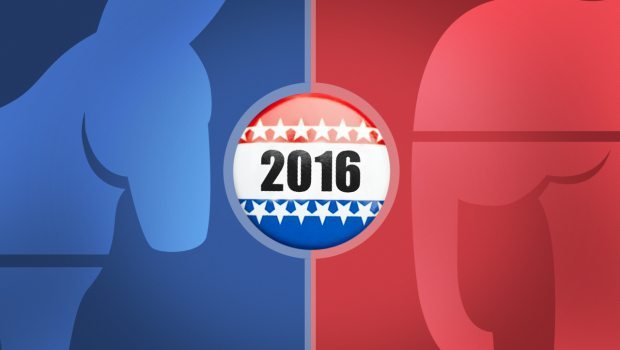Well, yes and no. Aren’t all presidential elections the most important election in history? It certainly feels that way, especially if you listen to the media buzz that emanates every four years. The future of the country is at stake. The direction of our foreign and domestic policies will be set by the voters in this election.
So it shall be in 2016, but this time there is some truth to the hype. We’ve just witnessed a few Supreme Court decisions that have profoundly changed the country’s political and social landscape. We are still suffering from the after-effects of the Great Recession. Race has roared back as a flashpoint issue. The world situation is critical (as it always seems to be). And by the end of this month, we’ll likely have over 20 people who’d like to run this government formally declare their intention to do so. Impressive. Or foolish.
Right now I would say that the edge in the race has to go to the Democrats, if for no other reason than they have a clear front-runner in Hillary Clinton and control of the electoral college map. The Republicans are far more split than the left and the remnants of the Tea Party are forcing some of the more moderate candidates to run farther to the right than they’d like. Of course, Bernie Sanders might have that impact on Clinton, forcing her to the left, but she has the advantage of being a known quantity for the past two decades. In addition, more of the Republican candidates are nationally known than are Martin O’Malley and Jim Webb, which means that it will be more difficult for their messages to find daylight.
The Republicans will have the burden to show that they can run the country more effectively than President Obama has during his term. The problem is that more Americans favor the Democratic position on most major issues. Most of the GOP candidates have come out against the court’s marriage equality ruling and want to enact religious freedom laws to protect those people who oppose that decision. These laws might be popular in certain states, but when Indiana tried to enact such a law in March, it met with intense opposition from the business community, the NCAA, and other groups who are committed to a diverse educational and workplace environment. Plus, moderates favor marriage equality, and the GOP will need those voters in key states if it wants to win next November. Rolling back the major civil rights issue of our day will likely be a self-inflicted wound from which the Republican Party will not likely recover.
The same is true, to a lesser extent, on the issues of health care and immigration. The American public is still split on whether the ACA is good policy, but most people want the law to be fixed, not repealed. That the Supreme Court saved the law will provide fundraising fodder for the right, but the GOP cannot afford to take health insurance away from those who already have it under the exchanges. They have floated a fix, but it would repeal the personal mandate, and that would cause havoc because those premiums are keeping the law afloat. And the health care industry is changing so rapidly because of the law that companies and hospitals would probably oppose anything that cuts into their profits or practices. Remember that the ACA was based on conservative principles. The GOP should recognize that. If they can’t find a way to fix the law, they might find that public opinion turns more to the left, and towards a public health care system that’s the dream of most Democrats.
Donald Trump notwithstanding, the Republicans have a big problem when it comes to immigration. Any candidate that echoes Mitt Romney’s “self deportation” policy in 2016 will lose badly. Marco Rubio supports an immigration plan that is more progressive than the other candidates and he’s paying for it by losing support among conservatives. One of the candidates is going to have to convince the faithful that a new immigration law is in the best interests of the party and the country. That candidate will then have chance at winning the general election.
The Democrats have their own problems because they can’t run too far away from President Obama, but they can’t be too close either. Americans like the idea of more forceful environment action, but don’t like executive orders. They want higher wages and less income inequality, but don’t want higher taxes or government regulation of the economy. And I suspect that most people don’t want the government to punish banks, as Sanders and Elizabeth Warren have advocated.
The Republicans need to present a more positive message to the country about what they’re going to do if elected, not continue to be against everything that the Democrats are for. They have to realize, as the Democrats did in the 1980s, that their policies are not connecting with enough voters for them to win a national election. This election, though, like most, will be fought on economic and security grounds. Again, the GOP is on the defensive as they are seen as the protectors of the wealthy and against spending on infrastructure, public education, and health issues. An arch conservative, like an arch liberal, will not win in 2016. Pragmatism and a vision to move us forward will.
Because this is the most important election of them all.
For more, go to www.facebook.com/WhereDemocracyLives or Twitter @rigrundfest
